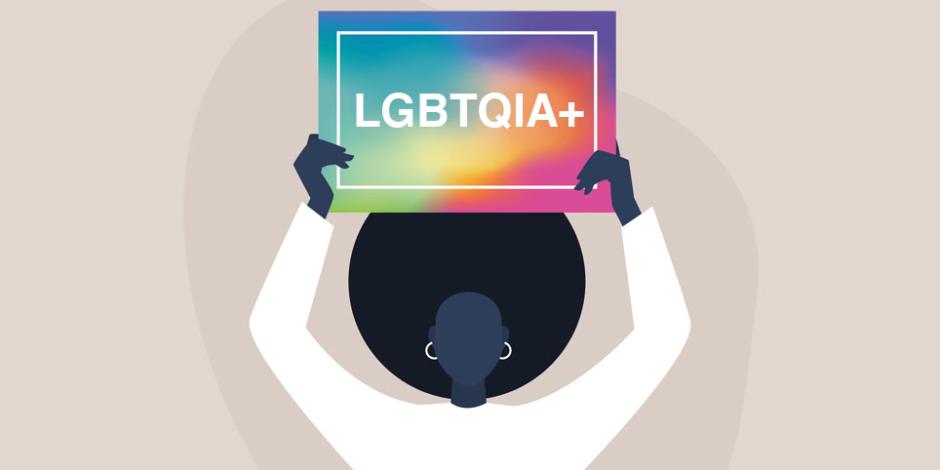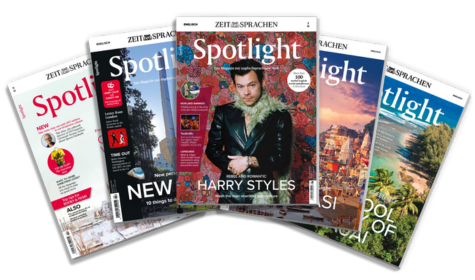The world is a diversebunt gemischt, vielfältigdiverse place. Thanks to social media, we’re in daily contact with people from the most diverse set of communities we’ve ever experienced — not only geographically widespread, but diverse also in terms of our lifestyles, experiences and beliefs. To to embraceumarmen; hier: bereitwillig annehmenembrace this diversity, our language needs to be respectful and inclusive.
Over the next few pages, we present key language that is both inclusive and up to date, so that you have the words and phrases you need to make everyone feel comfortable — and avoid accidentally to cause offenceAnstoß/Unmut erregencausing offence.
Please note that people within groups sometimes disagree about the words they would like to be used to describe them, but our aim here is to provide an overview of the key terms to show respect for diversity. In this overview, we give you the language you need to feel confident in your day-to-day interactions with people who are different from you. After all, inclusive and respectful language is one of the tools for positive change in the world.
Info to go
The word “normal” is problematic in discussions about differences because it can easily be misunderstood. If the majority are “normal”, then the minority are, by definition, “abnormal”.
Race
The Black Lives Matter (BLM) movement has drawn attention to the racism that underlies society, not only in the US, but also in many other countries around the world. Thanks to BLM, many of us now recognize that it’s not enough “not to be racist”; we have to be more actively anti-racist, too. For many white people, this means being aware of the advantages they have in daily life thanks to their race. It also means being aware of the language we use to describe people of different ethnicities.
The word black (often written with a capital letter in the US) has now been reclaimneu beanspruchenreclaimed as a source of pride as well as racial identity, but remember that it’s usually used as an adjective (e.g. “black history”, “black women”) and rarely as a collective noun, which should be avoided.
Americans also use the term African American, recognizing both the African origins and American nationality of their black citizens.
Of course, racial diversity is not a question of simply “black or white”. The easiest way to describe someone’s racial identity is to use the phrase
of ... heritage...stämmigof … heritage, such as “of Somalian heritage” or “of Chinese heritage”.
The acronym BAME (pronounced [beɪm] or spelled out letter by letter) is used in the British media as an inclusive term for everyone who’s “non-white” — for example “BAME actors”. The abbreviationAbkürzungabbreviation stands for “black, Asian and minority ethnic”. The term person of colour is often used, too.
It is important to be aware that the language of racial relations continues to evolve, and what is acceptable today may be offensive tomorrow.
Warning
Although “person of colour” is in current use, the similar-looking term “coloured” is not acceptable these days. It carries memories of the era of racial segregation in the US. The term “coloured” is, however, acceptable in South Africa, where it refers to a multiracial ethnic group. Of course, using the “N” word is totally unacceptable.
Gender
In 2017, London Underground replaced the greeting “Ladies and gentlemen” in its announcements with more gender-neutral greetings, such as “Good morning, everyone”. The company felt the time had come to question their use of language. Do we still need to address each gender separately? Do independent working women still want to be called “ladies”? And what about those people who don’t define themselves as either a man or a woman — how do you include them, too? The word everyone is a nice, easy solution.
Gender is now recognized as being non-binary and more fluid. Transgender people may identify as a different gender from the one they were to assignzuordnenassigned at birth, or may be in the process of to transitionübergehentransitioning from one gender to the other. If you find yourself wondering, “Is this person a man or a woman? I don’t want to get it wrong!” you can ask, “Which gender do you identify as?” — and be ready to accept either answer, or “neither”.
None of us have to label ourselves as “he” or “she” any more; the gender-neutral alternative is they. “They” takes a plural verb, even when it is used for one person, as in “Do you know Jack? They’re an activist.” Some, often younger, people — not only transgender or non-binary people, but also members of the wider community who are aware of gender issueFrage, Themaissues — even helpfully sign their e-mails with their preferred personal pronouns in bracketKlammerbrackets after their name, for example “Jack Smith (he / him)” or “Jack Smith (they / them)”.
Sexuality
The days of people being labelled either gay or straight are long past. We now see sexuality as a spectrum, as reflected in the rainbow flag flown at pride marches. Along with heterosexual, homosexual and bisexual, there is also the broader term pansexual and, for those who don’t experience physical attraction to others, asexual. To cover this broad range of sexuality, the most commonly used abbreviation (or “initialismInitialwort, Akronyminitialism”) is LGBT, which stands for “lesbian, gay, bisexual and transgender”. You may also see LGBTQ, adding queer or questioning into the mix, or LGBTQIA+, adding intersex and asexual and the plus to be fully inclusive of all other possibilities.
Warning
“Queer” is one of those words that was formerly used as an insult but has now been reclaimed by the community. However, it is best avoided if you’re not a member of that community yourself.
Neurodiversity
The term “neurodiversity” refers to the different ways in which our brains function. There is so much more recognition now of neurodivergence — the range of conditions that can to affectbeeinflussen, beeinträchtigenaffect the way we learn and interact with each other, such as conditions on the autistic spectrum and ADHD (attention deficit hyperactivity disorder), as well as specific learning difficulties, including dyslexiaLegastheniedyslexia and dyscalculiaRechenschwächedyscalculia. A person who does not have these neurological characteristics is neurotypical.
Warning
Terms such as “autistic” are medical diagnoses. They are not terms to be used casuallyzwanglos, saloppcasually or lazily. A person you find difficult to engage with is not necessarily “on the spectrum”. Similarly, a very tidy or fussypenibel, heikelfussy colleague should not be called “a bit to be OCD (obsessive-compulsive disorder)eine Zwangsstörung habenOCD”. These expressions are offensive and should be avoided.
Disability
Our bodies are all different, regardless of whetherunabhängig davon, ob ...regardless of whether you’re able-bodied or not.
To make services more accessible for people with physical disabilities, we should take into to take sth. into accountetw. mitberücksichtigenaccount their special needs or special requirements and check for accessibility arrangements.
We should also remember the slogan “Not all disabilities are visible”. A huge range of physical and mental health conditions are not immediately obvious.
Within the disabled community, many people use the term impairmentEinschränkungimpairment to talk about their medical condition or the physical limitations of their body (such as mobility difficulties). For them, the word “disability” describes the social effects of that impairment (such as not being able to use public transport). In their view, it is not the person who is “disabled” per se but, instead, society, which often does not take their needs into consideration. However, this distinctionUnterscheidungdistinction is rarely made in the mainstream media and the terms disabled person or a person with a disability are still the most widely used expressions.
Warning
The term “handicapped” is now considered old-fashioned and offensive, and should therefore be avoided. Also, try not to use the outdated phrase “He’s in a wheelchair”, as it makes the person sound passive and powerless. Wheelchair users prefer the more active option “I use a wheelchair”.
Neugierig auf mehr?
Dann nutzen Sie die Möglichkeit und stellen Sie sich Ihr optimales Abo ganz nach Ihren Wünschen zusammen.



